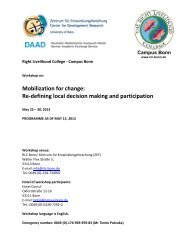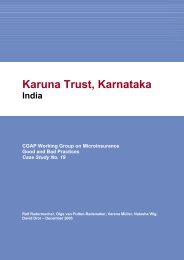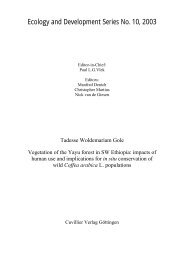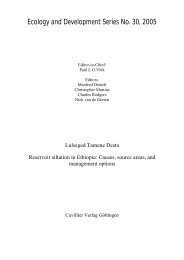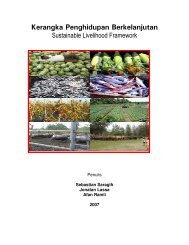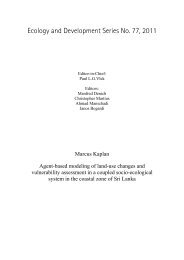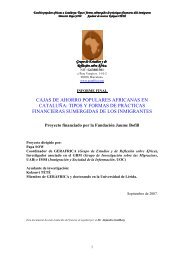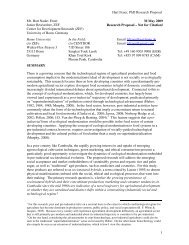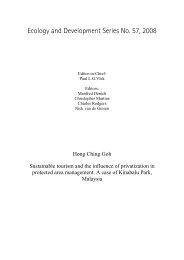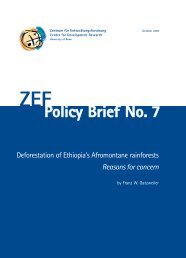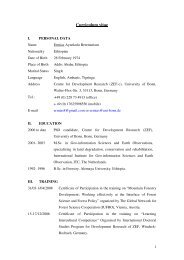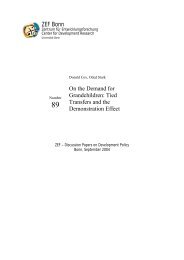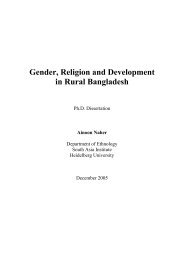Maksud Bekchanov - ZEF
Maksud Bekchanov - ZEF
Maksud Bekchanov - ZEF
Create successful ePaper yourself
Turn your PDF publications into a flip-book with our unique Google optimized e-Paper software.
Curriculum Vitae<br />
<strong>Maksud</strong> <strong>Bekchanov</strong><br />
PhD Research Fellow<br />
Center for Development Research (<strong>ZEF</strong>)<br />
Walter-Flex-Str. 3<br />
D-53113 Bonn, Germany<br />
Phone: +49228/73-1799 (w)<br />
E-mail: maksud@uni-bonn.de<br />
<strong>ZEF</strong>-profile: http://www.zef.de/staff/963.html<br />
EDUCATION<br />
PhD (ongoing), Economics (Agriculture), Center for Development Research (<strong>ZEF</strong>), Bonn<br />
University, Bonn, Germany, October 2009 – present<br />
M.Sc., Economics (Water Resources Management and Agriculture), Tashkent Institute of<br />
Irrigation and Melioration (TIIM), Tashkent, Uzbekistan, September 2005 - June 2007<br />
B.S., Economics (Macroeconomics), Urgench State University (UrSU), Urgench, Uzbekistan,<br />
September 2001 - June 2005<br />
THESES<br />
• PhD thesis: Efficient Water Allocation and Water Conservation Policy Modeling in the<br />
Aral Sea Basin.<br />
Supervisor: Prof. Dr. Joachim von Braun; <strong>ZEF</strong> - Center for Development Research<br />
Abstract: Increased water demand due to population growth and economic development under the mounted investment costs<br />
for developing new water sources calls for efficient, equitable and sustainable management of water resources in many<br />
developing countries. This is more essential in the Aral Sea Basin where the tremendous development in irrigation since the<br />
1960s combined with unbalanced water resource management led to the destruction of the ecosystems in the delta zone and the<br />
gradual desiccation of the Aral Sea, once the fourth biggest lake of the world with a surface area of 68,000 km 2 and total water<br />
volume of 53.4 km 3 . Disintegration of the Central Asian states after the collapse of the Soviet Union also increased the conflicts<br />
over water and infrastructure sharing among the riparian countries. Insufficient private and public investment on agricultural<br />
machinery and irrigation infrastructure, lack of economic incentives to adopt water-wise approaches, inefficient water governance<br />
and institutions, and less changed old mindset under new conditions of market economy have been the main reasons of<br />
decreased water use efficiency in the post-Soviet period. Integrated hydro-economic model was applied in this study to examine<br />
the role of benefit sharing based water allocation for water use efficiency improvement in the Aral Sea basin as an alternative to<br />
the traditional administrative water allocation. Preliminary results indicated a huge potential of water productivity and economic<br />
welfare improvement through introducing benefit sharing based water transfers.<br />
• Master thesis: Assessing Comparative Advantages of National Agricultural<br />
Commodities in the World Market Using Policy Analysis Matrix (PAM) Method:<br />
evidence from the Khorezm region, Uzbekistan. Tashkent, Uzbekistan: TIIM, 2007.<br />
Supervisor: Dr. Sandjar Djalalov; SDC - Swiss Agency for Development and Cooperation<br />
Abstract: Climate, soil, and water conditions in Uzbekistan are very convenient to produce a wide variety of agricultural<br />
commodities. However, inefficient input use, underdeveloped market infrastructure, and government intervention impede to attain<br />
the potential yields and employ the full production capacities in the agricultural sector. Two main market policies - price<br />
liberalization and open market establishment - in the agricultural sector are of utmost importance in the country due to its<br />
willingness to obtain WTO membership rights. Policy Analysis Matrix (PAM) method is used in this study to analyze comparative<br />
advantages of the agricultural commodities produced in Uzbekistan and to assess incentives for farmers to use resources more<br />
efficiently under the conditions of liberalized input and output prices. High competitive advantages of national agricultural<br />
commodities in the world market are estimated using Domestic (DRC) and Private (PRC) Resource costs. Successful use of<br />
these competitive advantages for agricultural development can be reached by (i) improving agricultural input and output markets,<br />
(2) developing market infrastructure including storage, transport, and distribution systems, (3) reviving agro-processing industries,<br />
and (4) liberalizing agricultural commodity markets.<br />
CV: <strong>Maksud</strong> <strong>Bekchanov</strong> Page 1 of 5
• Bachelor thesis: Temporal-Spatial Cluster Analysis and Econometric Modeling of<br />
Small Business Development in the Khorezm Region. Urgench, Uzbekistan: UrSU,<br />
2005<br />
Supervisor: Prof. Dr. Sanatbek Salaev; Economics Faculty of Urgench State University<br />
Abstract: Small business and private entrepreneurship plays a pivotal role for economic development in the post-Soviet<br />
transition countries through providing sustainable incomes to the middle income group of the population and maintaining rapid<br />
adoption of innovations. However, due to uneven development of SB across the regions and economy sectors governments<br />
usually face the questions of where they have to invest and what is the optimal rate of tax for sustainable development of SB. In<br />
order to determine the priority of different districts to allocate small business maintenance investments, the districts of the<br />
Khorezm, north-western region in Uzbekistan, were classified into three groups according to the level of small business<br />
development using advanced cluster analysis tools. To analyze the impact of tax policies on the small business development and<br />
determine tax rate, which is optimal in terms of benefits for both the entrepreneurs and the government, simultaneous regression<br />
equations system, which includes general economic relationships of SB development, was constructed.<br />
PROFESSIONAL EXPERIENCE (EMPLOYMENT AND INTERNSHIP)<br />
• Junior researcher at <strong>ZEF</strong> (Center for Development Research) / Bonn University,<br />
Bonn, Germany; 1) Developed hydro-economic model to test the role of water trading<br />
for efficient water use in the Aral Sea Basin; 2) Constructed national input-output table<br />
of Uzbekistan to assess intersectoral virtual water flow; 10/2009 - present<br />
• Junior researcher at <strong>ZEF</strong>/UNESCO (Khorezm) project, Urgench, Uzbekistan; 1)<br />
Developed national and regional computable general equilibrium (CGE) models to<br />
assess the impact of the agricultural policies on water and land use and<br />
macroeconomic situation in Uzbekistan; 2) Developed linear programming model to<br />
assess economic and technical efficiency and adoptability of different water saving<br />
technologies in Western Uzbekistan (Khorezm); 10/2007-09/2009<br />
• Lecturer & Tutor of the course on “Principles of Economics” (Part time), Industry &<br />
Transport College, Urgench, Uzbekistan; 01/2008-07/2008<br />
• Accountant in Tashkent Region Branch of Joint-Stock Company “Matbuot<br />
Tarqatuvchi”, Tashkent, Uzbekistan, 05/2007-10/2007<br />
• Teaching Assistant (Part time) in International Educational Center (IEC), REI<br />
(Resource Exchange International) - English Language courses, Tashkent,<br />
Uzbekistan, 10/2005– 04/2007<br />
• Internship in the Department of Statistics. Urgench, Uzbekistan, 04/2005-05/2005<br />
AWARDS:<br />
• IPSWAT (International Post-graduate Studies on Water Technologies) scholarship for<br />
PhD studies, 2009-2012<br />
• <strong>ZEF</strong>/UNESCO (Khorezm) project scholarship for Master studies, 2005-2007<br />
• Al-Khorezmi Scholarship of Urgench State University, 2003-2005<br />
• First prize award in several national and regional Olympiads on Mathematics, 1999-2001<br />
MEMBERSHIP:<br />
• International Input-Output Association (2012-2013)<br />
• Deutsche Vereinigung für Wasserwirtschaft, Abwasser und Abfall e.V. (2010-2011)<br />
CV: <strong>Maksud</strong> <strong>Bekchanov</strong> Page 2 of 5
COMPUTER SKILLS:<br />
Windows, MS Office, GAMS, SPSS, STATA<br />
LANGUAGES:<br />
English (Fluent), Uzbek (Native), Russian (Good), German (Basic), Turkish (Basic)<br />
RESEARCH INTERESTS:<br />
Water Resources Management, Water Markets, Virtual Water, Agro-Industrial Systems,<br />
Irrigation technologies, Climate Change, Food Security, Hydro-economic Modeling, Input -<br />
Output analysis, General Equilibrium Modeling, Economic modeling, Macroeconomics,<br />
Trade<br />
SELECTED PUBLICATIONS<br />
• <strong>Bekchanov</strong> M., A. Bhaduri, M. Lenzen, and J.P.A Lamers, 2012. The role of virtual<br />
water for sustainable economic restructuring: evidence from Uzbekistan, Central Asia.<br />
<strong>ZEF</strong> Discussion Paper No. 167.<br />
• <strong>Bekchanov</strong> M., A. Bhaduri, M. Lenzen, and J.P.A Lamers. 2012 (submitted). The role<br />
of virtual water for sustainable economic restructuring in Uzbekistan, Central Asia.<br />
Journal of Water Resources Management.<br />
• Bobojonov I., J.P.A Lamers, M. <strong>Bekchanov</strong>, C. Martius, 2012 (under review). Options<br />
and constraints for crop diversification: a case study in sustainable agriculture.<br />
Journal of Sustainable Agriculture.<br />
• <strong>Bekchanov</strong>, M., J.P.A. Lamers and C. Martius, 2012 (accepted). Coping with water<br />
scarcity in the irrigated zones of a lower Amudarya region, Central Asia. In: A.<br />
Khamzina, I. Rudenko, J.P.A. Lamers, P.L.G. Vlek (Eds.), <strong>ZEF</strong> book III.<br />
• <strong>Bekchanov</strong> M., J.P.A Lamers, A. Karimov, M. Müller, 2012. Estimation of spatial and<br />
temporal variability of crop water productivity with incomplete data. Ch. 20. In: C.<br />
Martius, I. Rudenko, J.P.A. Lamers, P.L.G. Vlek (Eds.), Cotton, Water, Salts and<br />
Soums: Economic and Ecological Restructuring in Khorezm, Uzbekistan. Springer.<br />
329-344<br />
• <strong>Bekchanov</strong> M., M. Müller, J.P.A Lamers, 2012. A Computable General Equilibrium<br />
Analysis of Agricultural Development Reforms: National and Regional Perspective.<br />
Ch. 21. In: C. Martius, I. Rudenko, J.P.A. Lamers, P.L.G. Vlek (Eds.), Cotton, Water,<br />
Salts and Soums: Economic and Ecological Restructuring in Khorezm, Uzbekistan.<br />
Springer. 347-370<br />
• Ibragimov N., Y. Djumaniyazova, J. Ruzimov, R. Eshchanov, C. Scheer, K. Kienzler,<br />
J.P.A. Lamers, and M. <strong>Bekchanov</strong>, 2012. Optimal Irrigation and N-fertilizer<br />
Management for Sustainable Winter Wheat Production in Khorezm, Uzbekistan. Ch.<br />
11. In: C. Martius, I. Rudenko, J.P.A. Lamers, P.L.G. Vlek (Eds.), Cotton, Water, Salts<br />
and Soums: Economic and Ecological Restructuring in Khorezm, Uzbekistan.<br />
Springer. 171-180<br />
CV: <strong>Maksud</strong> <strong>Bekchanov</strong> Page 3 of 5
• <strong>Bekchanov</strong>, M., J.P.A. Lamers and C. Martius, 2010. Pros and Cons of Adopting<br />
Water-Wise Approaches in the Lower Reaches of the Amu Darya: A Socio-Economic<br />
View. Water, 2, 200-216.<br />
• <strong>Bekchanov</strong> M., 2009. Econometric Modeling and Prediction of Small Business<br />
Development. Uzbek Journal of Economics and Education, #4/ 2009, TSEU,<br />
Tashkent; pp. 101-104.<br />
• <strong>Bekchanov</strong> M. and J. Djanibekov, 2009. Statistical Modeling of Lower Amu Darya<br />
Water Flow Volatility and its Impact on Water Availability in Irrigated Agriculture. In:<br />
Soliev A. et al. (eds), Information Bulletin of Uzbekistan Geographic Society, Volume<br />
34. Uzbekistan Geographic Society, Tashkent.<br />
• <strong>Bekchanov</strong> M., Kan E. and Lamers J., 2009. Options of agricultural extension<br />
provision for rural development in Central Asian transition economies: the case of<br />
Uzbekistan. Proceedings of international conference "Research for Sustainable<br />
Development" held in 14th May 2009. Westminster International University in<br />
Tashkent - British Council - TEMPUS, Tashkent.<br />
• <strong>Bekchanov</strong> M., Sharipov A., 2008. Water Use Efficiency and Financial Feasibility of<br />
Different Water Saving Technologies. Proceedings of international conference on<br />
Water and Soil Conservation Agro-technologies in the Agriculture of Uzbekistan.<br />
UzPITI- ICARDA- IWMI, Tashkent.<br />
PROFESSIONAL TRAININGS AND WORKSHOPS<br />
• Workshop on “Leadership and Change”; Tutored by Holger Nauheimer (Change<br />
Facilitation Group); Center for Development Research (<strong>ZEF</strong>), Bonn; May 29 – June 2,<br />
2012.<br />
• Workshop on “Topics in Econometrics and Statistics: Microeconometric Analysis”;<br />
Lectured by Frank Vella (Georgetown University); Institute for the Study of Labor<br />
(IZA), Center for Development Research (<strong>ZEF</strong>), Bonn; May 21-25, 2012.<br />
• International Winter School 2012 “GIS in Water Resources Management”; Institute for<br />
Technology and Resources Management in the Tropics and Subtopics (ITT); Cologne<br />
University of Applied Sciences, Cologne, Germany; January 16-20, 2012.<br />
• Lecture series on “Time Series Econometrics”; BGSE, University of Bonn, Bonn,<br />
Germany. Sommer semester, 2011.<br />
• Lecture series on “Development Economics”; ILRI, University of Bonn, Bonn,<br />
Germany. Sommer semester, 2011.<br />
• Seminar on “GIZ Development Cooperation in the Water Sector”, organized by GIZ<br />
and DWA, Eschborn, Germany, June 15, 2011.<br />
• Workshop on “Reverse Degradation by Innovation: New Pathways of Sustainable<br />
Natural Resource Management”; RLC-Rural Livelihood College; Bonn, Germany;<br />
June 1, 2011.<br />
• Workshop on “Instruments of Optimal Irrigation Water Using”; SIC-ICWC, Tashkent,<br />
Uzbekistan; November 22-23, 2010.<br />
CV: <strong>Maksud</strong> <strong>Bekchanov</strong> Page 4 of 5
• Workshop on “Phase Space Reconstruction from Time Series Data”, Instructors: Prof.<br />
Dr. Ray Huffaker, Prof. Dr. Ernst Berg, Theodor-Brinkmann-Graduate School,<br />
University of Bonn, Bonn, Germany, 22-25 March 2010.<br />
• Lecture series on “Labor Economics” organized by IZA (Institute for the Study of<br />
Labor), Bonn (Germany), 10-12/2009<br />
• Workshops on “Game Theory and Econometric Modeling” organized by BGSE (Bonn<br />
Graduate School of Economics), Winter Semester, 2009-2010, University of Bonn.<br />
• Lectures Series - Dependence Modelling by Lévy Processes with Applications to<br />
Mathematical Finance, Insurance and Econometrics, Claudia Klüppelberg (Technical<br />
University of Muenchen), November 16 - December 2, 2009<br />
• Workshop on “Learning Intercultural Competence”, by Bonn Interdisciplinary Graduate<br />
School for Development Research (BiGS-DR) of <strong>ZEF</strong> (Bonn University) and<br />
SYNERGIE Soziale Bildung (funded by DAAD), Windeck-Rosbach, Germany,<br />
December, 2009<br />
• Workshop on “Financial Mathematics meets Econometrics”, Stefan Ankirchner,<br />
Claudia Klüppelberg, Christian Pigorsch, Robert Stelzer (organizers),November 30 -<br />
December 1, 2009<br />
• Training program on “Mathematical Modeling of Agro and Food Systems” (Lecture<br />
Series) by Theodor-Brinkmann-Graduate School, Bonn, Germany, Winter Semester,<br />
2009-2010<br />
• Training workshop on Strategic Planning and Team Work, STRATAGEM by GTZ<br />
(Germany), Bonn, Germany, October, 2009<br />
• Training program on “Managerial Accounting in Farm Enterprises in terms of market<br />
economy” by Vayenshtefan University and GTZ, Tashkent, Uzbekistan, 2007<br />
• Training program on “Business planning” by OBSE, Urgench, Uzbekistan, 2005<br />
• Lectures Series – Economic Mathematical Modeling and Econometrics, Economics<br />
Department of Urgench State University, Urgench, Uzbekistan, winter semester,<br />
2004-2005<br />
REFERENCES:<br />
Dr. Anik Bhaduri; Senior Researcher at Center for Development research (<strong>ZEF</strong>);<br />
Tel.: +49 (0) 228 / 73 4967(w);<br />
Email: abhaduri@uni-bonn.de<br />
Dr. John Lamers; Senior Researcher at Center for Development research (<strong>ZEF</strong>);<br />
Coordinator of <strong>ZEF</strong>/UNESCO (Khorezm) Project;<br />
Tel.: +49 (0) 228 / 73-4926 (w), Bonn; (+998-62) 226-21-19 (w), Urgench;<br />
Email: j.lamers@uni-bonn.de<br />
Dr. Christopher Martius; Senior Fellow at Center for Development research (<strong>ZEF</strong>);<br />
Tel.: +49 (0) 228 / 73-1816 (w);<br />
Email: c.martius@uni-bonn.de<br />
CV: <strong>Maksud</strong> <strong>Bekchanov</strong> Page 5 of 5



